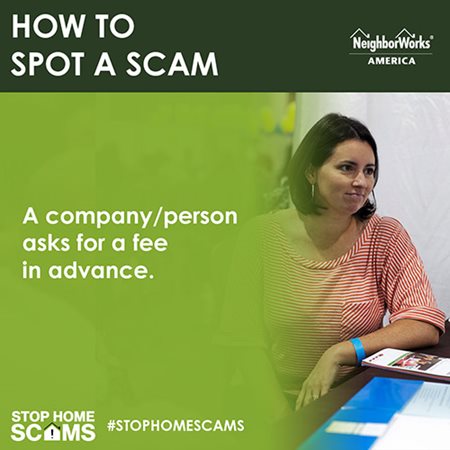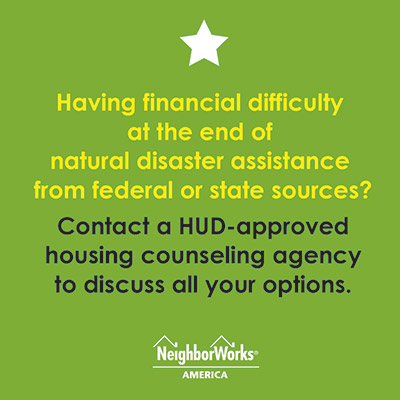The application looked official. There was letterhead. And there were catch phrases like "specialized counselors" and "hardship." But a client who was assisted by Housing Partnership for Morris County stopped just short of working with the company, which would have charged him $1,300 just to begin a loan modification process. The client sought a modification due to financial stress caused by COVID-19.
When the homeowner sent the paperwork to the Housing Partnership, a NeighborWorks organization in Dover, New Jersey, staff recognized it immediately as a scam, says Jessica Padilla Gonzalez, executive director of the Housing Partnership. But to an untrained eye, it can be difficult to tell the difference. "Typically, people come to us as an organization after the fact, after they've already lost funds," Gonzalez says. In this case, the resident came at the right time.
This week is National Consumer Protection Week, and scams are on a lot of people's minds, especially now, during COVID-19, when families already impacted by a tougher economic situation also become targets of scams. Marietta Rodriguez, president and CEO of NeighborWorks America, has talked about the importance of knowing the signs of a housing scam to help avoid – and quickly report -- scam activities. NeighborWorks recently launched StopHomeScams.org, an initiative to help people avoid scams by recognizing the signs. A number of NeighborWorks organizations received grants to help spread the word about scams. Housing Partnership of Morris County was one of those organizations. The initiative received a significant contribution from the Wells Fargo Foundation.
 "It's typical of our area for a fee to be charged of $1,300 or higher," Gonzalez says. "We see it more in our Spanish-speaking communities." The reason they see it more in the Latino population, she says, is that when Latino clients see a letter that says, "ABC Bank verses Resident," they automatically assume they need legal representation from an attorney. "Some companies or parties claiming they can help a homeowner will charge excessive fee and don't do any work or advocacy for the client the way we would," she says. "They provide them with forms that almost look like ours. They're duplicating what we, as nonprofits, use to help our clients."
"It's typical of our area for a fee to be charged of $1,300 or higher," Gonzalez says. "We see it more in our Spanish-speaking communities." The reason they see it more in the Latino population, she says, is that when Latino clients see a letter that says, "ABC Bank verses Resident," they automatically assume they need legal representation from an attorney. "Some companies or parties claiming they can help a homeowner will charge excessive fee and don't do any work or advocacy for the client the way we would," she says. "They provide them with forms that almost look like ours. They're duplicating what we, as nonprofits, use to help our clients."
In this case, the NeighborWorks organization began immediately working to help the resident apply for modification – without the $1,300 fee. "We help them assess their situation, look at their budget, look at the affordability, and assisted them with collecting all of the documents and submitting the modification forms directly to the lender, Gonzalez says. They also encouraged the resident to report the scam.
Several of the Housing Partnership's clients have been approached in similar fashion this year. "We get the majority of our clients through word of mouth," Gonzaelz says. They've been increasing their social media presence when it comes to talking about scams – on Twitter, Facebook and Instagram. They also connected with the local Chamber of Commerce. And they get references through word-of-mouth and the New Jersey Housing Mortgage Finance Agency. But they're not able to reach all of their clients and would-be clients, particularly those who speak Spanish, through those venues. "Honestly, as a nonprofit, it's a lot of leg work and a lot of stating the message over and over and over again: We're here to help. We're HUD-approved. We don't charge."
Foreclosure can hit anybody, Gonzalez says, and so can foreclosure-related scams. "People making $80,000 a year can also be victims of predatory services."
As the Housing Partnership prepares to use their NeighborWorks grant to help spread information about scams, they are making contact with New Jersey's Spanish newspaper, trying to figure out how to get the word out through a connection that works for the Spanish-speaking community. Among the ideas discussed is a series about housing and scams. Getting the word out is also the focus of an upcoming board retreat.
There's a lot of misinformation to fight, Gonzalez says. One client, for instance, went to a predatory lender in Staten Island after hearing an ad on a radio station.
Meanwhile, her organization is reaching out to the mayor's office, creating videos, and making sure to answer the phone so that they can create the proper level of trust with the community. It usually takes several conversations before clients are ready to move forward with a modification. "There are a lot of scammers out there," she says.
Better Housing Coalition in Richmond, Virginia, wants to make sure homebuyers are up-to-date on scams, too. They're using their grant from NeighborWorks, with help from the Wells Fargo Foundation, to get the word out. "People have fallen on hard times during COVID," says Stacie Birchett, vice president of external affairs. "Right now they might be more susceptible to grasping at every possible solution." Knowing that some of those solutions could include scams or predatory lending, the organization plans to continue using social media and other outlets to make sure people are aware of resources, like those offered at StopHomeScams.org.
Resource Development Coordinator Lucy Shaffer, who works at St. Ambrose Housing Aid Center in Baltimore, Maryland, says her organization, too, is continuing to alert clients to potential scams. The community has reported an increase in targeted emails and telephone calls, especially now, about insurance or home warranties expiring (when they aren't), energy bill overages (that don't really exist) and ways to receive their stimulus check, really an excuse to get personal information. So far, St. Ambrose clients have steered clear. "The scammers have even incorporated the texting element to appear more personal," Shaffer says.
Baltimore, Maryland, says her organization, too, is continuing to alert clients to potential scams. The community has reported an increase in targeted emails and telephone calls, especially now, about insurance or home warranties expiring (when they aren't), energy bill overages (that don't really exist) and ways to receive their stimulus check, really an excuse to get personal information. So far, St. Ambrose clients have steered clear. "The scammers have even incorporated the texting element to appear more personal," Shaffer says.
Gonzalez says the red flag she sees most often is scammers guaranteeing they can keep residents in their homes. "That's not always the outcome," she says, as much as they may want it to be. Another flag: "If they're charging you a fee before they even process your application."
More advice from StopHomeScams.org includes:
- avoid companies that tell you to stop paying your rent or mortgage.
- reach out to your landlord or mortgage company when you are struggling with monthly payments.
She encourages residents to start planning immediately for whether they'll need loan modifications or how they're going to pay forbearances back once those forbearances come to an end. Planning can alleviate some of the desperation that makes people susceptible to scams. And like other HUD-approved NeighborWorks organizations, Gonzalez says again, "we're here to help."

